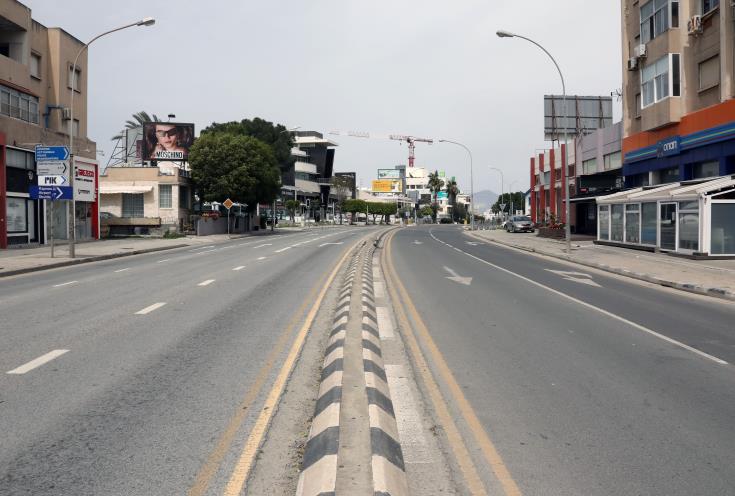As the global economy braces itself for its worst crisis since the 1930s, Cyprus is reassessing initial estimates of the impact of coronavirus while the jury is still out over how long it will take the island to recover.
Despite an IMF projection that the Cypriot economy will shrink by 6.5% and rebound with a growth of 5.6% in 2021, things look grimmer on the ground.
Cyprus’ Finance Ministry is already preparing for the worst as the country’s economy is expected to take a much bigger hit from the coronavirus crisis than the initially anticipated ceiling of 9.7% GDP.
In the early stages of the outbreak, Finance Minister Constantinos Petrides said he expected GDP to shrink between 5-9.7% depending on the duration of the economic shutdown.
According to media reports, the Finance Ministry is now recalculating scenarios which envisage a greater impact.
Apparently, one scenario sees the economy shrinking by 10.6% of GDP while the worst-case scenario predicts a whopping 13% retraction.
The first scenario takes into consideration that the economy will be on lockdown for two months, which would mean that the state’s financing needs will increase by €3.6 bln.
The second scenario is based on the economy locked down for 3-4 months, and financing needs spiralling to €5 bln.
Although the economy was not expecting GDP growth similar to 2019’s 3.2%, it was hoping to see a growth rate of 2.6% and a budget surplus of €600 mln in 2020.
As things stand 2020 is expected to close with a €1 bln budget deficit.
Since mid-March all non-essential businesses have been closed to combat the COVID-19 pandemic, the economic activity will remain restricted until at least April 30.
According to Professor Louis Christofides of the University of Cyprus, losses for the economy based on the extreme scenario could be €3.7 bln or 11.82% of GDP.
He said the current isolation phase entails a major reduction of economic activity in the non-essential sectors, causing major losses and possible bankruptcies for many firms.
To calculate the impact of COVID-19 on the Cyprus economy, Christophides said that this should be explored in three interconnected scenarios.
“In scenario (i), it will be assumed that this phase will, in one form or another, last for four months or 1/3 of a year, followed by a phase in 2020H2 when the economy will exit the state of isolation and the normal rate of output will be re-established.”
He noted, the first scenario overlooks two further effects that are likely to be present during 2020H2 and would result in additional GDP losses due to (ii) lingering COVID-19, that may reappear sometime in the autumn and (iii) a drastic drop in tourist arrivals and revenues.
“The impact of the initial and two further shocks on GDP is evaluated at €3.7 bln or 11.82% of GDP. Such a reduction in GDP would generate a fall in government revenues by an equal percentage, raising the government’s fiscal needs by €1.51 bln.”
The UCY professor said the fiscal requirements to strengthen the economy are difficult to predict but have been budgeted at a minimum of €1 bln if loans that are guaranteed by the government do not go into default.
Combined fiscal needs will be in the region of €2.51 bln, or11.41% of GDP, adding these percentage points to the debt/GDP ratio.
Meanwhile, Cyprus has borrowed €1.75 bln from international markets to bolster the state’s liquidity and capability to support the local economy during the coronavirus pandemic, it borrowed another €1.25 bln from local banks by issuing 12-month Treasury Bills.
Also concerned about the Cypriot economy, CIIM professor George Theocharides said the evidence is discouraging.
“We should expect a sharp and deep recession, rising unemployment, substantial fiscal deficit, and a sharp increase in the level of public debt,” said Theocharides.
Main sectors that drive our economy – tourism, construction, shipping – will be badly hit whereas the impact on the services industry will be probably less severe, he added.
He noted that the government’s response measures will be important so that when the economy starts functioning again, the recovery will come faster and stronger.
Theocharides argued that a necessary measure is being held up at Parliament, involving the state guarantees of €2 bln to encourage banks to provide cheap funding to viable businesses and the self-employed people during the crisis.
This would mean that in case of future losses, the risk is disseminated between the state (70%) and the banking institution (30%).
“This would also mean that borrowers will not be allowed to proceed with layoffs until the end of the year.”
Opponents of this measure argue that the funding should come directly from the state and not the banks.
The counterargument to this is that the state guarantee is a contingent liability and might never be materialised.
So, it does not increase the level of debt, at least not at the moment.
“Furthermore, the government does not have the mechanism of deciding which companies to fund or not. And even if it did, it could have easily created a moral hazard issue.
This is the role of the banks that have ample liquidity and are ready to fund the market. What the government can do is to monitor this scheme.”
Put technology first
UCY economics professor Sofronis Clerides said the coronavirus crisis may push Cyprus to rethink its economic model and diversify its portfolio, so as not to depend on one or two sectors as it is currently.
“Although saying that, every crisis brings opportunities, is a cliché, it is, however, a good cliché, and one which we should take seriously this time around.
For example, this might be the right time to start planning and developing further other promising industries such as education or research and innovation.”
He argued that Cyprus tourism has not only written off 2020 but will probably suffer in 2021 too as without a vaccine the virus will not be brought easily under control.
Clerides said that Cyprus should take the crisis as a wake-up call to become more digitally driven to be able to compete in the global economy.
He argued that the crisis has exposed both the private and public sectors’ weaknesses in this area as few organisations were able to immediately switch online and continue offering their services.
“Although the public sector has made many advancements within a matter of weeks, whereas it would have taken it some years, it is still struggling to operate in this difficult environment.”
Clerides said the state will have to invest heavily in neglected e-government.
However, as he noted, the private sector also is lagging, as large retail businesses have not been able to move part of their business online and set up a delivery service.
He said universities will have to reorganise, as education is one of the most vulnerable sectors in such crisis.
“Long-distance learning can only solve part of the challenge. Many universities depend on the physical presence of students, so does a large number of jobs.”










